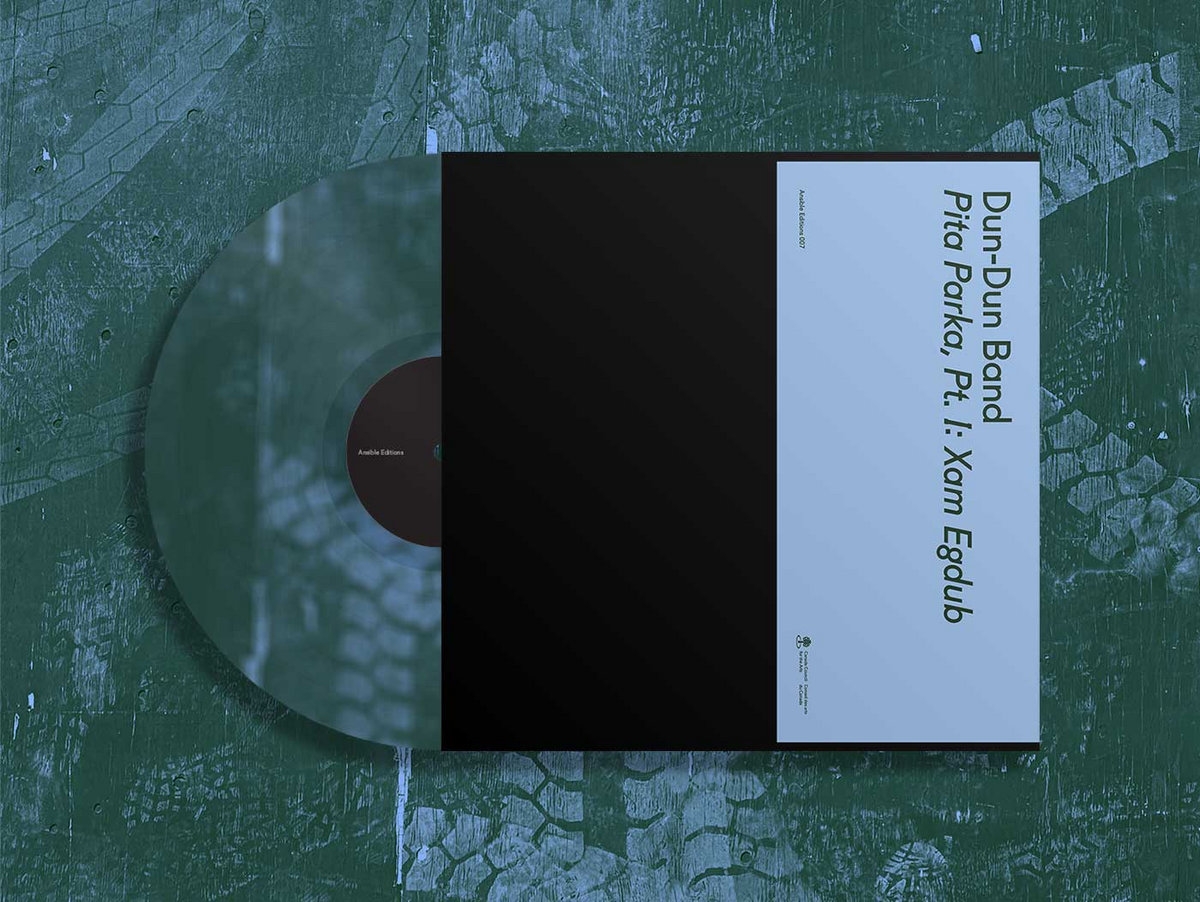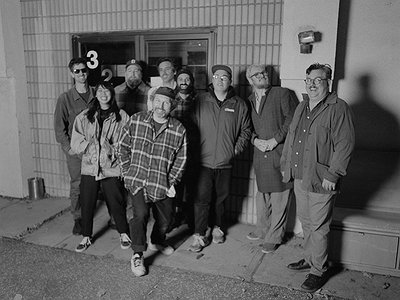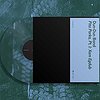Name: Craig Dunsmuir
Nationality: Canadian
Occupation: Guitarist, composer, improviser
Current release: Craig Dunsmuir's Dun-Dun Band release their new album Pita Parka Pt. 1 : Xam Egdub May 3rd 2024 via Ansible Editions.
Recommendations: Eremite Records has been on a real roll in recent years IMO (and the below two ensembles are massive Dun-Dun influences, tbqh!)--accordingly, I heartily recommend checking out:
1) Joshua Abrams & Natural Information Society - Mandatory Reality
2) Jeff Parker ETA IVtet - Mondays at the Enfield Tennis Academy
[Read our Joshua Abrams interview]
[Rread our Anna Butterss of ETA IVtet interview]
If you enjoyed this Craig Dunsmuir interview and would like to keep up to date with his music, visit him on Instagram, twitter, and Mixcloud.
When I listen to music, I see shapes, objects and colours. What happens in your body when you're listening? Do you listen with your eyes open or closed?
I suppose it depends on what kind of listening I'm engaging in, whether it be the timbres, melodies, rhythms, production style / mix / stereo field or lyrics.
But I don't tend to 'see' anything, although some of my favourite music does suggest abstract architectural shapes (especially Autechre and Morton Feldman); I only listen with my eyes closed when sleeping (but I do always listen to music when sleeping, so in all honesty it's probably close to a 50/50 split between eyes open/closed!).
Entering new worlds and escapism through music have always exerted a very strong pull on me. What do you think you are drawn to most when it comes to listening to and creating music?
As touched on in Q1 re: the quasi-architectural appeal of Ae and Feldman, I do love the world-building and -deconstructing / -analysing / -wandering aspect of listening to music, and I'd argue it does tie/feed into a good amount of the music I make.
What were your very first steps in music like and how would you rate the gains made through experience?
My first steps involved
a) being taught piano lessons around age 5 or 6 and hating them/it;
b) starting to play guitar at around age 14 and falling in love with the fun and freedom of learning punk/alternative rock songs via power chords (and soon enough detuning my low string down to drop D, which I've never bothered to tune back up!); with a short detour by way of
c) horribly playing clarinet in high school band, which initiated my admiration of the likes of Eric Dolphy, but ultimately led to me resigning myself to stick to the guitar and leave the woodwinds to the pros (of which there are now four in Dun-Dun, haha).
According to scientific studies, we make our deepest and most incisive musical experiences between the ages of 13-16. What did music mean to you at that age and what’s changed since then?
Music meant everything to me then, first via the dance-pop/hip-hop hits of Milli Vanilli, MC Hammer, Vanilla Ice, Black Box, Technotronic, Soul II Soul, Rob Base & DJ EZ Rock and Public Enemy as a tween (I was born in 1978), and then whole universes of underground and experimental music opening up post-Nevermind via connecting the dots between Nirvana → Melvins → Sonic Youth etc.
Both absolutely nothing and competely everything have changed since then.
[Read our Melvins interview]
How would you describe your own relationship with your instrument, tools or equipment?
Mainly as a tool; I'm a left-handed guitarist, which is great because it limits how many guitars I could potentially buy in a guitar store (ie. not many, ha). I prefer devices/instruments that are limited, but within those limits can encourage creativity once you hunker down and get lost in them.
Some of these include, excluding my trusty lefty Yamaha Pacifica, of course, my Roland Handsonic; my TASCAM Portastudios, which I very slightly simultaneously upgraded/downgraded years ago from big clunky digital CD-R 8-track to not-much-bigger-than-a-Monotron 4-track; my Korg Monotron (typing of which); my kalimba thumb piano; my Yamaha JX 25 amp (Yamaha, please sponsor me); and my Roland Handsonic (Roland, it would be also be very cool if you wanted to sponsor me.
Where does the impulse to create something come from for you? What role do often-quoted sources of inspiration like dreams, other forms of art, personal relationships, politics etc play?
Once or twice I've had a musical dream (Including, absurdly enough, McCartney trying to show me something on piano once!), but I always forgot it immediately/before successfully transcribing/recording.
Since I make almost entirely instrumental music, I'd say that song titles are where there's the biggest explicit outside influence, whether nodding to band/artist names that have inspired me, things I have seen on walks, or events in my life.
Relating to walking, I find the most interesting melodies come when away from your instrument, when your voice (whether literal through humming/singing to self, or 'inner' voice of thought), and not your hands, guides the way.
Are you acting out parts of your personality in your music which you couldn't or wouldn't in your daily life? If so, which are these? What, would you say, are the key ideas behind your approach to music?
Sometimes, yes, in terms of song titles or the odd vocal refrain relating to personal issues I would have difficulty expressing to anyone else or would be hesitant to process in a diaristic/journal-keeping manner.
For the most part, though, my approach to music is very structural, as in riff-based; I write hundreds of riffs each year, and almost none of them get used, but that still amounts to 20-30 at any given period being shaped into the 'riff medleys' that form my music.
If music is a language, what can we communicate with it? How do you deal with misunderstandings?
I really value that music is an inherently abstract / imprecise / vague language, even when a singer-songwriter's lyrical cards are laid bare on the table for us as listeners, since the meaning of a song can vary wildly from person to person.
As long as I'm not trying to rehearse with them, I love the misunderstandings that inevitably arise!
Making music, in the beginning, is often playful and about discovery. How do you retain a sense of playfulness and how do you still draw surprises from tools, approaches and musical forms you may be very familiar with?
It might help that, as a full-time retail clerk, I am literally an amateur musician; if I didn't love playing around with music first alone at the writing stage, and then continuing to refine arrangements with my Dun-Dun Bandmates (all of whom are much more accomplished and 'pro' than me), I wouldn't have much incentive to initiate the process.
(On a another note, the fact that all my riff ideas are first sketched out on individual scraps of paper has often helped foster playfulness at the writing stage, in terms of assembling/combining ideas that I had at different times, then occasionally retroactively transposing them if they sound more congruent in a different key, etc.)
Sound, song, and rhythm are all around us, from animal noises to the waves of the ocean. What, if any, are some of the most moving experiences you've had with these non-human-made sounds? How far would you describe them as “musical”?
Probably the most moving experiences I've had with noises/sounds would be via making field recordings, since then after recording something, once it's tied to a piece of music production it get emotionally embedded into both a story and a time which you can return to by simply clicking play.
The example that immediately comes to mind for me would be the bird sounds I recorded and gave to Sandro Perri to use in his title track to his 2011 album Impossible Spaces, a very moving song written in tribute to his late friend and collaborator Jordan Somers.
There seems to be an increasing trend to capture music in algorithms, and data. But already at the time of Plato, arithmetic, geometry, and music were considered closely connected. How do you see that connection yourself? What aspects of music do you feel can be captured through numbers, and which can not?
As someone whose brain has been broken by years of listening to math rock, 20th/21-st-c. classical music and abstract techno, this is a massive part of both what I enjoy in the recordings of others as well as the music I myself make.
Pretty much all of the riffs that constitute the building blocks of Dun-Dun Band pieces are in odd time signatures, and hopefully those asymmetrical grooves not only stoke the heads of listeners, but also their hearts--not to be overly sentimental about it, but I personally love decoding complicated rhythms, and find that head-nodding or even dancing to them once that initially unlocking takes place can be hugely pleasurable.
How does the way you make music reflect the way you live your life? Can we learn lessons about life by understanding music on a deeper level?
I am an extremely solitary person, which is reflective in how I initially write my music (as well as how I have produced it solo, in terms of the home-recording aliases I have used during different non-Dun-Dun stretches of activity, from Fraid to The Craig Dunsmuir Solo Guitarkestra to Danger Figure Centre to Max Gross to Kanada 70).
I also conversely really cherish the friends I have made in music over the decades, many of whom are now in this band, so I'm very glad to be forced to catch up with them whenever we have a gig or recording session to rehearse for!
We can surround ourselves with sound every second of the day. The great pianist Glenn Gould even considered this the ultimate delight. How do you see that yourself and what importance does silence hold?
As anyone who has seen me walking around Downtown Toronto with headphones for earmuffs can attest to, I'm constantly listening to music (and, increasingly, [mostly music-related] podcasts, if I'm being completely honest).
It's my constant companion, but sometimes admittedly maybe too much so, for which reason sure, instead opting to sit on a park bench without music blasting into my skull with a (again, inevitably music-related!) book or magazine in hand is a much-needed, if only occasional, reset of sorts.
Do you feel as though writing or performing a piece of music is inherently different from something like making a great cup of coffee? What do you express through music that you couldn't or wouldn't in more 'mundane' tasks?
The fact that there are (often scaled up in the performer's mind, in that audiences are often much more forgiving than we give them credit for!) bigger potential negative consequences to messing up onstage than screwing up your pot of drip coffee, I think, helps imbue live performance with the urgency and unpredictability that can elevate what's going on onstage from something humdrum to something special.
If you could make a wish for the future – what are developments in music you would like to see and hear?
More great self-released and independent music of all kinds on such sites as Bandcamp!
The wish that, for better and worse (the 'worse' being my PayPal balance), is constantly getting fulfilled (as my BC wishlist grows to monolithic proportions) ...





